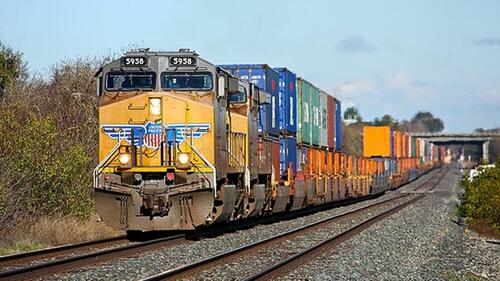
Negotiations between major railroads and their unions have stalled, setting up for what could be a significant railroad shut down before the midterm elections that could paralyze an already-strained US supply chain.
Railway Age reports the National Mediation Board (NMB) on June 14 began what could be a "ticking time bomb" toward a national railroad shut down within 90 days, following its board of three, two Democratic members agreeing with rail labor and NMB's only Republican disagreeing that means a voluntary agreement to amend unionized rail worker wages, benefits and work rules won't be achievable.
Talks between rail labor (12 rail craft unions bargaining in two coalitions on behalf of 115k rail workers) and major railroads, including Union Pacific Corp. and BNSF Railway Co., will enter a 30-day cooling period this Friday. Then the Biden administration may appoint a Presidential Emergency Board (PEB) to resolve the dispute.
"The railroads would consider accepting the proffer, but the union leadership has already indicated that it will not," the National Carriers' Conference Committee (NCCC), which represents major railroads, said in a statement. "The railroads expect a PEB will be appointed in this dispute before the end of the 30-day cooling-off period, as has been the case in prior unresolved national rail negotiations," NCCC continued.
Once the PEB is appointed, a second cooling period with a maximum 30-day clock begins. At the same time, the PEB listens to arguments from rail labor and railroads and issues its non-binding recommendations. The third 30-day period is where things could get problematic, just before the elections, and if both parties don't agree, either side can declare "self-help," meaning a strike would materialize.
A rail strike would devastate the economy even more, as approximately 28% of freight movement is transported on complex rail networks across the country. Depending on the strike's duration, supply chains would be further snarled and unleash unwanted inflation.
Let's hope rail labor and major railroads can agree on wages, benefits, and work rules immediately following the PEB appointment and unions do not resort to a strike in the third 30-day cooling period right before the midterm elections.
Negotiations between major railroads and their unions have stalled, setting up for what could be a significant railroad shut down before the midterm elections that could paralyze an already-strained US supply chain.
Railway Age reports the National Mediation Board (NMB) on June 14 began what could be a “ticking time bomb” toward a national railroad shut down within 90 days, following its board of three, two Democratic members agreeing with rail labor and NMB’s only Republican disagreeing that means a voluntary agreement to amend unionized rail worker wages, benefits and work rules won’t be achievable.
Talks between rail labor (12 rail craft unions bargaining in two coalitions on behalf of 115k rail workers) and major railroads, including Union Pacific Corp. and BNSF Railway Co., will enter a 30-day cooling period this Friday. Then the Biden administration may appoint a Presidential Emergency Board (PEB) to resolve the dispute.
“The railroads would consider accepting the proffer, but the union leadership has already indicated that it will not,” the National Carriers’ Conference Committee (NCCC), which represents major railroads, said in a statement. “The railroads expect a PEB will be appointed in this dispute before the end of the 30-day cooling-off period, as has been the case in prior unresolved national rail negotiations,” NCCC continued.
Once the PEB is appointed, a second cooling period with a maximum 30-day clock begins. At the same time, the PEB listens to arguments from rail labor and railroads and issues its non-binding recommendations. The third 30-day period is where things could get problematic, just before the elections, and if both parties don’t agree, either side can declare “self-help,” meaning a strike would materialize.
A rail strike would devastate the economy even more, as approximately 28% of freight movement is transported on complex rail networks across the country. Depending on the strike’s duration, supply chains would be further snarled and unleash unwanted inflation.
Let’s hope rail labor and major railroads can agree on wages, benefits, and work rules immediately following the PEB appointment and unions do not resort to a strike in the third 30-day cooling period right before the midterm elections.






